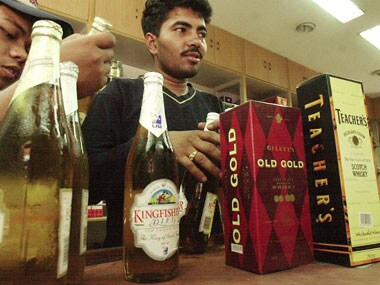The famous sociologist MN Srinivas said prohibition of alcohol was actually a sanskritic act, like cow slaughter. What he meant was that whatever justification was given, the Indian instinct to ban and prohibit came from a Brahminical, upper caste sensibility. It should therefore not surprise us that the makers of India’s constitution debated these two issues — beef ban and alcohol prohibition — on the same day, 24 November 1948. I am writing this because another state in India, Bihar, has implemented a ban on all alcohol. Kerala is already going that route, joining Gujarat and a couple of states in the Northeast. Bihar is ruled by Nitish Kumar. He claims that his ideology is Lohiate, meaning that it comes from Rammanohar Lohia. I have Lohia’s collected works in nine volumes and in them there is not much mention of prohibition, only casual references. Unlike Gandhi, Lohia does not offer us lectures on how terrible alcohol consumption is. In one place (Volume 6) Lohia attacks the president of India for being patron of the Calcutta Club, a place, he writes, whose main activity centres around wine drinking. However Lohia’s point is hypocrisy not moralism. He says “that the President of an alcohol-repressing republic should be the patron of an alcohol drinking club, is a measure of the fraud and perfidy which India’s higher castes are practicing upon the country and themselves.” [caption id=“attachment_2565814” align=“alignleft” width=“380”]  Representational image. AFP[/caption] Elsewhere he describes the prohibition as a “fringe detail” which interests Congress leaders. Perhaps Lohia knew that prohibition has not succeed anywhere in the world. Its three primary effects are to send the alcohol economy underground (depriving the state of revenue), to criminalise the casual drinker and to criminalise the police. In America in the 1920s prohibition produced big Mafia gang-leaders like Al Capone, who corrupted the police in cities like Chicago. In Gujarat, which has had prohibition for decades, alcohol is freely available because the police has been compromised at every level. The state has desperately made exceptions because total prohibition is impossible. Middle class Gujaratis carry ‘permits’ which allow them to drink for ‘health reasons’. This is of course mostly fraudulent. I was surprised to see that in Pakistan, there are government licensed liquor stores in Karachi. Today it is possible for the Indian tourists to drink legally in Pakistan but not in Gujarat, which I find remarkable. If prohibition keeps failing, why do states keep trying to achieve it? Out of the belief that it produces a better and more moral society. This is also a bogus argument. Look around the world at the nations of Europe, which have no prohibition, and those of the Arab world, of which many do. Which are more moral and better societies? And which one of them does India want to emulate? In 1948, the argument against eating beef was two fold. First there was the insistence (now proved to be wrong) from members like Professor Shibban Lal Saksena that cow slaughter should be banned for economic reasons. That cattle were an asset, the cow for milk and the bullock for tilling. Mechanisation and tractors has made that argument irrelevant. Only a handful of farmers till their land today with the bullock. Dr Raghu Vira of Central Provinces and Berar produced the real argument. This was located in Hindu dharma and said that ‘Brahma hatya and go-hatya’ were equal. Meaning that killing a learned man and scientist (i.e a Brahmin) brought the same punishment as killing a cow. Hindutva kept creeping into that Constituent Assembly debate on prohibition also. Bombay’s BG Kher said that “drinking of liquor is one of the five deadly sins which the Smritis have laid down.” The smritis have also prohibited Patels from reading and writing. Should we accept that? We are fortunate that a good constitution was produced despite such crude thinking. Two excellent speakers opposed prohibition. BH Khardekar of Kolhapur, making his first speech, said that “one argument put forth was that all communities want it. Parsis and Christians also were included in that list. Sir, I happpen to know Parsis and Christians a little bit and I think, Sir, definitely they are not in favour of prohibition.” Jaipal Singh of Bihar also opposed prohibition, speaking in favour of the Adivasi communities that traditionally brewed and consumed alcohol. He said, among other things, that “here, Sir, I submit by the back door we are trying to interfere with the religious rights of the most ancient people of this country.” I would say that the same thing applies for those Hindus who follow Shaivism and consume cannabis as bhang, charas or ganja, which have become criminalised because of a sanskritic attitude. Prohibition will, of course, ultimately fail in Bihar as it has failed in Gujarat. It may remain as a law, but drinkers will find a way around that law, the police will become criminalised and the state will miss out on revenue. Everyone will lose, but at least the Lohiaites will feel they tried to do the right thing.
Prohibition will, of course, ultimately fail in Bihar as it has failed in Gujarat. It may remain as a law, but drinkers will find a way around that law, the police will become criminalised and the state will miss out on revenue.
Advertisement
End of Article
Written by Aakar Patel
Aakar Patel is a writer and columnist. He is a former newspaper editor, having worked with the Bhaskar Group and Mid Day Multimedia Ltd. see more


)

)
)
)
)
)
)
)
)



